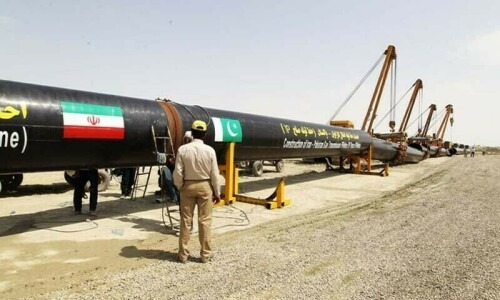ISLAMABAD: The recently elected government has made the decision to request an exemption from prospective US sanctions against Pakistani firms involved in the building of the gas pipeline connecting Iran and Pakistan.
“We’re going to ask to be spared from US sanctions. In an informal conversation with media on Monday night, Pakistan’s Minister for Petroleum, Dr. Musadik Malik, stated that the country cannot afford to impose penalties on the gas pipeline project.
This is in stark contrast to the Foreign Office’s position, as was stated at a press briefing last week by a spokeswoman, who stated that there was no possibility of a third party discussion or waiver.
After US ambassador Donald Lu stated last week in a detailed speech before a US House subcommittee that Washington was dedicated to blocking the pipeline’s development, the matter gained a lot of attention. Mr. Lu pointed out that Islamabad has not requested a waiver of any US penalties that the project would levy at this point.
Pakistan cannot afford penalties on the gas pipeline project, according to Musadik
In addition, Dr. Malik discussed the government’s worries during his speech over the gas firms’ proposal for a significant increase in gas prices, regardless of gains or losses in exchange rates.
He informed the media that Pakistan’s case for the waiver would be actively argued by the government in all appropriate forums on technical, political, and economic grounds, including through lobbying. In keeping with his contractual duties to Iran, he also expressed the expectation that the project’s construction would start shortly.
An official stated that although the draft of the request for an exemption from US sanctions had been finalized, the caretaker government had postponed filing it because of the shifting geopolitical landscape.
In response to a query, the minister stated that only 25% of people living in cities had access to natural gas, however more than 70% of their countrymen living in rural areas did not. The government would also need to make sure that electricity costs were reduced by rerouting natural gas to energy-efficient power plants, since 99 percent of the population was connected to the grid.
He clarified that the most efficient power plants in the system, six LNG-based power plants, were now producing electricity at a rate of between Rs. 22 and Rs. 26 per unit, depending on the LNG rate. If the domestic gas supply to those plants was guaranteed, the tariff might drop as low as Rs. 12 per unit. He promised, “We would ensure cheaper electricity.”
According to independent analysts, Pakistan may face consequences in the event that Iran pursued its arbitration proposal.
The guardians had made the decision last month to begin construction on an 80-kilometer (about $158 million) section of the gas pipeline, which would run from the Iranian border to Gwadar, in order to avoid potentially facing fines of $18 billion from Tehran.
The project will be funded by the Gas Infrastructure Development Cess and carried out by Inter-State Gas Systems (Pvt) Ltd (ISGS), a division of the petroleum division.
A committee headed by Prime Minister Shehbaz Sharif was established in January 2023 to suggest a course of action while considering the financial and economic feasibility of the pipeline. However, the group was superseded in September by a Ministerial Oversight Committee (MOC) during the caretaker administration.
The MOC obtained the waiver application produced by foreign legal counsel and approved the previous committee’s judgment.
Additionally, Willkie Farr & Gallagher LLP, a foreign law firm, provided an opinion to the MOC.
In reference to the US sanctions against Iran, Willkie Farr stated that penalties against the ISGS, which had minimal exposure to other countries, would probably be imposed if Pakistan moved forward with the project.
Willkie Farr stated that Pakistan did not have a solid case under French law after September 2019 about the force majeure and/or excusing event notice it had made since there was no documentary evidence to substantiate that the country had taken any steps to carry out the project. As a result, carrying out the project was thought to be the better choice.
The MOC advised that, despite the fact that the final text of the waiver application was available, its filing with US authorities be postponed owing to the geopolitical circumstances, based on this opinion and discussions held with Tehran over the previous year or so.
In accordance with Clause 19.1.1 of the gas sales and purchase agreement (GSPA), the petroleum division established a coordination committee in January to begin work on the 80km pipeline segment in light of Tehran’s notice of significant breach.
In May 2009, an agreement was made between Pakistan and Iran to supply 750 million cubic feet per day (mmefd) of gas from Iran’s South Pars gas field for 25 years. It was necessary for both nations to carry out the project in their own regions.
As per the deal, the project was scheduled to begin supplying by January of 2015. Iran has already constructed more than 900 kilometers of the pipeline; the final 250 km is still unfinished.
Iran’s government suggested in December 2012 that the project and an engineering, procurement, and construction contract be funded through a government-to-government accord. However, citing budgetary concerns, the Iranian government later withdrew from that deal in March 2014.
Therefore, in accordance with the terms of the sales and buy agreement, Pakistan served the National Iranian Oil Company (NIOC) with the notice of force majeure and/or excusing events. As a result, project operations were put on hold.
Both a notice under Pakistan’s sovereign guarantee and a notice of substantial breach of the sales and purchase agreement duties were served by the NIOC in February 2019.
After reopening negotiations with Iran, a revised sales and purchase deal was struck in September 2019 with a five-year extension granted by the French Civil Code.
The NIOC allegedly committed a substantial breach of the buyer’s guarantees and served Pakistan’s ISGS with a notice of material breach on December 21, 2023.
In accordance with the sovereign assurance that the Pakistani government had granted in its favor, the NIOC additionally delivered a notice.
The NIOC sent the case to the coordination committee for settlement, giving the ISGS 180 days to address the alleged material breach. Tehran may choose to take the project to the International Court of Arbitration in Paris if Pakistan refuses to carry it out, with a possible $18 billion contractual liability.








